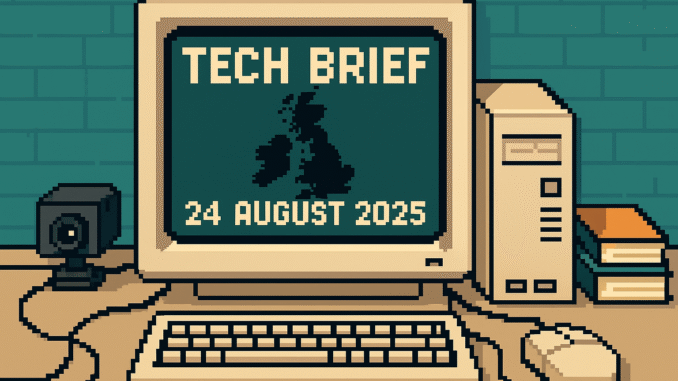
Tech Brief 24 August 2025 lands on a date that means something for anyone who’s ever right-clicked a “My Computer” icon. Today’s news brings public AI debates, police surveillance, and a proper seismic retro tech anniversary. No forced connections, just the honest state of UK tech culture, online privacy, and why the Start menu never dies.
Missed yesterday’s Tech Brief? Catch up here before diving in.
OpenAI Discusses £2 Billion Deal for National ChatGPT Access
“Would you trust a chatbot with your tax advice?” That’s what a Cabinet colleague really asked, according to a quick note buried in Friday’s Guardian piece. OpenAI boss Sam Altman and Technology Secretary Peter Kyle discussed plans for a government-funded, UK-wide rollout of ChatGPT Plus. The deal, which could total £2 billion, would hand premium access to every resident, not just civil servants or researchers. Supporters frame it as digital levelling up, similar to giving every home a library card in the 80s. Details are murky: will it be opt-in or bundled with GOV.UK log-ins? No guarantee on data privacy, either. For anyone who lived through clogged up school Nimbuses, this is déjà vu, complete with ambitious promises and the familiar whiff of procurement confusion.
Equality Watchdog Slams Met Police’s Use of Facial Recognition
A cold fact: live facial recognition technology on British streets is under judicial review, and now the Equality and Human Rights Commission has permission to step in. The Met Police’s plan is simple: roll out live facial recognition (LFR) kit at Notting Hill Carnival, ramp up “smart” city surveillance, and fight crime before it happens. The legality, however, is anything but settled. Critics say the kit violates equality laws and puts thousands at risk of wrongful flagging, especially in diverse crowds. Past fears from the cyberpunk 90s are coming true with AI and cloud servers replacing trenchcoats and floppy disks. Public trust is fraying. Who gets to say if this is progress or just dystopia in a blue tabard? No easy answers.
Metal Gear Solid 3: Delta Remake Rekindles Classic PS2 Memories
“Twenty years on, Snake Eater still makes me cry,” says voice actor David Hayter. The nostalgia is not just for jungle stealth but for an era when game saves came on actual cards and boss fights sparked real, living-room frustration. The Metal Gear Solid 3: Delta remake, launching later this year, keeps the original voice acting and promises not to flatten its weirdness. PS2 fans made this title legendary by swapping discs, arguing controls, and discovering strange bugs that became part of playground folklore. Now, new players get upgrades but also the risk of missing the disc era rituals. If you’re after real stealth, try hiding your best memory card from a younger sibling.
MoD Data Breaches Grow Amid Afghan Evacuations
Let’s drop historical context: In 2025, government IT is still springing leaks. The Ministry of Defence’s Afghan Relocations and Assistance Programme suffered far more data breaches than first disclosed, according to new BBC FOI findings. Personal details of Afghan citizens and staff at risk have been mishandled, left vulnerable to hostile actors, and the numbers just keep snowballing. Digital security protocols meant to prevent these failures have repeatedly been ignored or skirted. You would think that, after decades of warnings about network vulnerabilities and more than a few ambitious government tech promises, there would be something like a working lock on the proverbial filing cabinet by now. There isn’t. Many families remain at risk because of these digital blunders.
From the Wayback Machine
On This Day: 1995, Microsoft released Windows 95, introducing the Start menu, Plug and Play hardware, and user-focused multitasking. This operating system unified MS-DOS and Windows in a single product, changed desktop habits across Britain, and became a defining moment for consumer computing. Most of its icons and workflows remain recognisable in every Windows release since. Credit, too, to the unsung engineers who wrangled legacy code to make the transition from MS-DOS nearly seamless for millions. If you ever set up dial-up networking on a 386, this was the day your patience was tested.
What This Means
With Tech Brief 24 August 2025, nostalgia comes hand in hand with public scrutiny. The battle over AI access and the looming questions about surveillance do not just echo the past; they push us to ask: what lessons from Britain’s digital history are still being ignored, and which new challenges are worth meeting head on?
Unplug if you must, but keep your curiosity powered up. The Start menu waits for nobody.
Missed yesterday’s Tech Brief? Catch up here

Leave a Reply